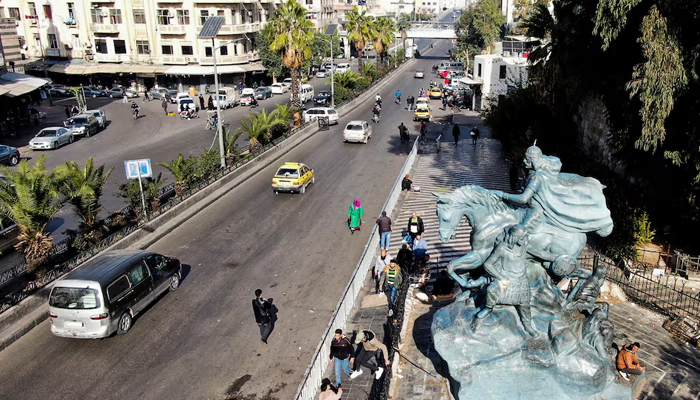Pakistanis stuck in Syria to return by Dec 12 night, PM told
Pakistani nationals who had reached Beirut from Syria to be flown back to Pakistan on chartered flight on night between December 12 and 13
Prime Minister Muhammad Shehbaz Sharif was on Wednesday apprised that the stranded Pakistani nationals who had reached Beirut from Syria would be flown back to Pakistan on a chartered flight on night between December 12 and 13.
The prime minister was briefed on the status of Pakistani nationals in Syria when he chaired an important meeting on their evacuation, a statement from the PM's Office said on Wednesday.
During the meeting, Federal Minister for Planning, Development, and Special Initiatives Ahsan Iqbal was tasked with ensuring a warm welcome for the returning Pakistanis at the airport.
The Pakistanis were stranded after rebels ousted Syrian president Bashar al-Assad in a lightning offensive spearheaded by the Hayat Tahrir al-Sham (HTS) group and its allies, which brought a spectacular end to the five-decade-rule.
In response, Prime Minister Shehbaz Sharif held a telephonic conversation with his Lebanese counterpart Najib Mikati and sought his support in facilitating the immediate evacuation of Pakistani nationals, stranded in Syria through Beirut.
Mikati had assured Shehbaz that Lebanon would wholeheartedly welcome Pakistani nationals from Syria and extend all possible support to them in their safe return home.
Later, around 350 Pakistani nationals including 245 Pakistani Zaireen stranded in Syria crossed the Syria-Lebanon border for safe repatriation.
Meanwhile, rebel leader Ahmad al-Sharaa's group is stamping its authority on Syria's state with the same lightning speed that it seized the country, deploying police, installing an interim government and meeting foreign envoys — raising concerns over how inclusive Damascus' new rulers intend to be.
Since Sharaa's HTS group swept al-Assad from power on Sunday at the head of a rebel alliance, its bureaucrats — who until last week were running an administration in a remote corner of Syria's northwest — have moved into government headquarters in Damascus.
The appointment of Mohammed al-Bashir, the head of the regional government in HTS' enclave of Idlib, as Syria's new interim prime minister on Monday underlined the group's status as the most powerful of the armed groups that battled for more than 13 years to end Assad's iron-fisted rule.
Although it was part of al Qaeda before breaking ties in 2016, HTS had reassured tribal leaders, local officials, and ordinary Syrians during its march to Damascus that it would protect minority faiths, winning broad approval.
The message helped smooth the rebels' advance and Sharaa — better known as Abu Mohammed al-Golani — has repeated it since Assad's ouster.
-
Security forces gun down 30 terrorists in multiple IBOs in KP: ISPR
-
MQM-P calls for new province in Sindh
-
US report validates Pakistan military edge over India: PM
-
Banned TTP poses serious threat to Pakistan security: UNSC panel
-
CM Afridi clarifies remarks on by-poll after ECP requests army deployment
-
Dubai sees 3.2m Pakistani passengers in 2025 as airport sets new milestone
-
Security forces kill 23 Indian proxy terrorists in KP's Kurram
-
Pakistan to construct island to boost oil exploration: report












